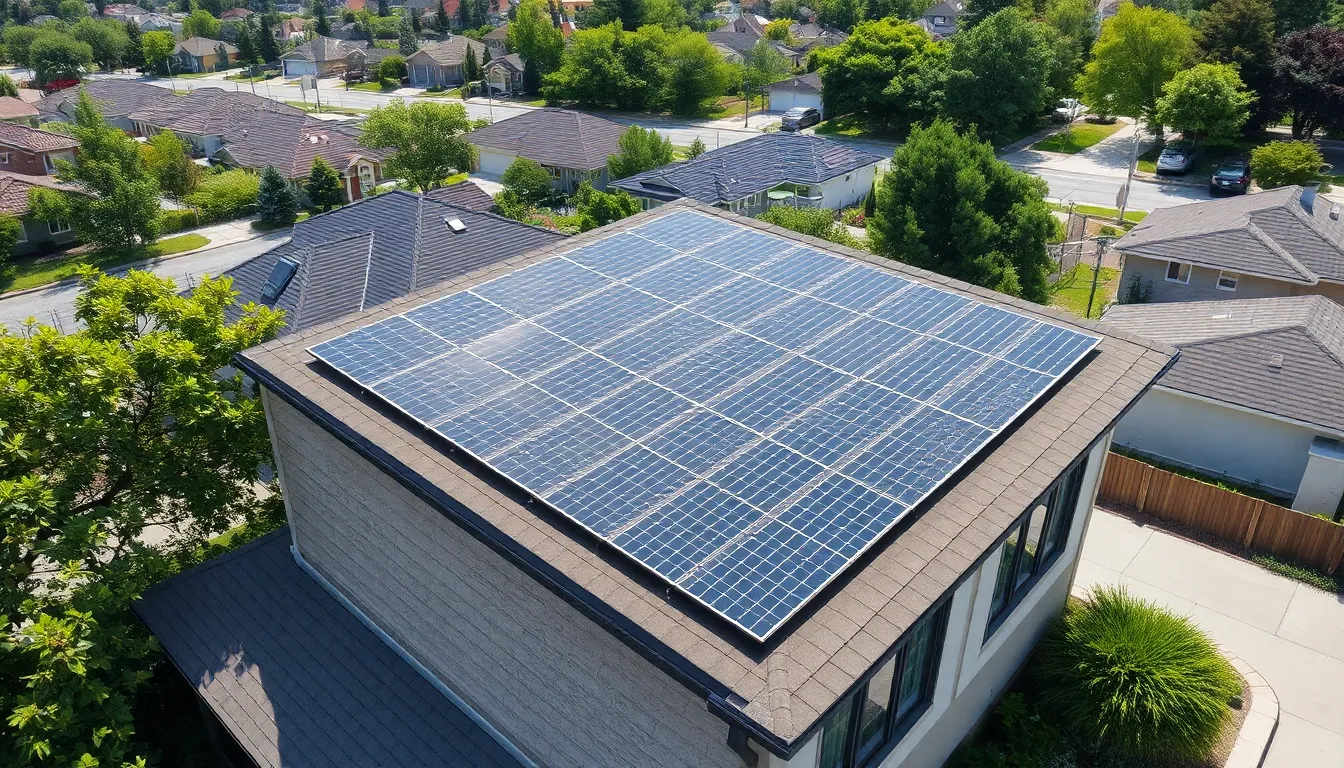In a world where the only thing growing faster than technology is the pile of plastic in the ocean, eco-smart technology swoops in like a superhero with a green cape. It’s not just about saving the planet; it’s about making life easier, smarter, and a tad more fabulous. Imagine a home that knows when to turn off the lights and a car that whispers sweet nothings about fuel efficiency.
Eco-smart tech isn’t just a trend; it’s a lifestyle choice that combines innovation with sustainability. Whether it’s solar panels that double as modern art or smart thermostats that keep your home cozy without costing the earth, this tech is here to revolutionize our daily lives. Buckle up as we dive into the world of eco-smart solutions that’ll have you laughing all the way to the bank—and the recycling bin.
Table of Contents
ToggleOverview of Eco-Smart Technology
Eco-smart technology serves as a crucial answer to environmental challenges. Solutions like solar panels and smart thermostats showcase how innovation integrates seamlessly with sustainability. Each technology reduces energy consumption while enhancing convenience, ultimately supporting eco-friendly lifestyles.
Energy-efficient appliances illustrate significant advances in reducing waste. A smart thermostat, for example, learns user patterns to optimize heating and cooling, leading to savings of up to 30% on energy bills. Additionally, solar panels harness renewable energy, decreasing reliance on fossil fuels and lowering carbon footprints.
Innovative startups develop eco-smart tech that addresses plastic pollution in oceans. Products made from biodegradable materials replace conventional plastics, reducing landfill overflow and ocean contamination. Various companies also create apps that promote recycling and waste reduction, connecting consumers with local recycling resources.
Moreover, urban areas adopt green building technologies. These include energy-efficient lighting, sustainable building materials, and green roofs. Each component contributes to healthier living spaces and lower greenhouse gas emissions, making cities more resilient to climate change.
Integrating eco-smart technology into daily life creates positive environmental impact while improving quality of life. From home automation systems to electric vehicles, each advancement aids individuals in making environmentally conscious choices. Striving for a more sustainable future motivates widespread adoption of these innovations, highlighting their importance in combatting ecological crises.
Benefits of Eco-Smart Technology

Eco-smart technology offers numerous advantages that benefit both the environment and the economy.
Environmental Impact
Eco-smart technology significantly reduces carbon footprints and promotes sustainability. Innovations like solar panels generate clean energy, decreasing dependence on fossil fuels. Smart home gadgets optimize energy usage, leading to a reduction in overall consumption. The adoption of biodegradable materials minimizes plastic pollution, protecting ocean ecosystems. Urban green buildings feature energy-efficient designs, contributing to lower greenhouse gas emissions. Communities benefit as these technologies improve air quality and enhance biodiversity in urban landscapes.
Economic Advantages
Economic benefits accompany the use of eco-smart technologies. Many renewable energy solutions lead to lower utility bills, providing financial relief for households. Businesses implementing energy-efficient practices often see substantial savings, which improve overall profitability. The development of eco-friendly products fosters new job creation in green industries, fueling local economies. Additionally, government incentives for sustainable technologies further enhance financial viability for consumers and businesses alike. With increased energy efficiency, investments in eco-smart technology yield long-term economic gains.
Types of Eco-Smart Technology
Eco-smart technology includes a range of solutions designed to promote sustainability while enhancing everyday living. The following subcategories showcase how technology can positively impact the environment.
Renewable Energy Solutions
Solar panels exemplify a popular renewable energy solution, converting sunlight into usable electricity. Wind turbines also generate clean energy, harnessing the power of wind to produce electricity sustainably. Hydroelectric systems utilize flowing water to create energy, further diversifying renewable options. Geothermal energy taps into the Earth’s heat for heating and cooling, reducing reliance on fossil fuels. These solutions contribute significantly to lowering carbon emissions and combatting climate change.
Smart Home Innovations
Smart thermostats represent a key innovation in home automation, optimizing energy use based on daily patterns. Smart lighting systems adjust automatically, enhancing efficiency while reducing energy consumption. Home energy management systems track energy usage in real time, allowing users to make informed adjustments. Additional devices, such as programmable appliances, further improve energy efficiency. Together, these innovations foster energy conservation and enhance comfort within living spaces.
Challenges in Adoption
Adopting eco-smart technology faces several challenges that impact its widespread use.
Cost and Accessibility
High upfront costs hinder many individuals and businesses from investing in eco-smart technology. While solar panels and smart home devices reduce long-term expenses, initial financial barriers persist. Furthermore, access to incentives varies by region, limiting opportunities for some. Urban settings often enjoy more resources than rural areas, creating disparities in accessibility. Alternative financing options and government support can increase adoption rates, but awareness of these opportunities remains inconsistent.
Consumer Awareness
Limited understanding of eco-smart technology poses a significant challenge. Many consumers are unaware of the benefits or functionality of these innovations. While information exists, it’s often not easily accessible or presented in an engaging manner. Educational campaigns and product demonstrations can highlight effectiveness and simplicity of use. Promoting benefits like energy savings and environmental impact can enhance consumer interest and spur adoption rates. Increased awareness directly influences demand, leading to greater investment in sustainable solutions.
Future of Eco-Smart Technology
Advancements in eco-smart technology promise to reshape the future of sustainable living. Renewable energy sources, such as solar panels and wind turbines, are increasingly efficient. Innovations, such as energy storage systems, allow for better integration of these sources into everyday life.
The rise of smart home devices enhances comfort and energy efficiency. Smart thermostats adjust heating and cooling based on real-time data, potentially reducing energy bills by 30%. Enhanced features in smart lighting systems enable users to minimize waste by providing personalized automation.
Emerging biodegradable materials represent another frontier in eco-smart technology. New products made from plant-based substances aim to replace conventional plastics and mitigate ocean pollution. As consumers demand greener alternatives, companies are responding with innovative options that prioritize sustainability.
Urban planning will incorporate eco-smart solutions to create greener cities. Green building techniques focus on reducing environmental impact by using efficient materials and technologies. Such developments can lead to reduced greenhouse gas emissions and healthier living conditions.
Despite challenges, such as high upfront costs and awareness gaps, governments and organizations are beginning to prioritize eco-smart technology. Incentives like tax rebates and grants enhance accessibility for more households and businesses. Educational initiatives will further promote understanding, leading to broader acceptance among consumers.
Ongoing investments in eco-smart solutions promise a significant impact on future environmental conditions. Collaborative efforts between individuals, businesses, and policymakers will ensure these technologies gain traction, ultimately contributing to a sustainable lifestyle.
Eco-smart technology represents a transformative path toward a sustainable future. By integrating innovation with eco-conscious choices, individuals and businesses can significantly reduce their environmental impact. The advancements in renewable energy and smart home solutions not only enhance daily living but also offer substantial economic benefits.
As awareness grows and accessibility improves, embracing these technologies becomes essential for combating environmental challenges. The collaborative efforts of consumers, businesses, and policymakers will pave the way for a greener world. Investing in eco-smart solutions is not just a choice for today; it’s a commitment to a healthier planet for future generations.




